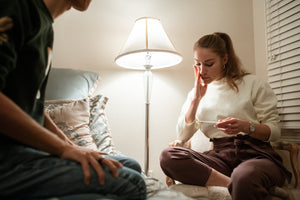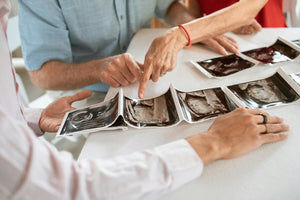Getting Pregnant | Can You Ovulate Late in Your Cycle?
When you’re trying to become pregnant, knowing when you’re ovulating is a huge plus. Normally, ovulation occurs around two weeks before your next menstrual cycle, but for some women this isn’t the case. If you use an online ovulation calculator, it’s much easier to keep track of it, but what if you determine that you’re ovulating a little later in the month than many women do? We’ll now explore some of the facts when it comes to late ovulation that some women experience.
Ovulation Basics
Ovulation doesn’t occur when you’re menstruating; in most women, it occurs roughly 14 days before your next period is set to begin. This, however, is based on the average ovulation cycle of 28 days, which not all women follow. Ovulation is the process of releasing an egg from your ovaries, and it can occur anywhere between seven days and 19 days before your next cycle comes. If it happens only a week before your period, it’s important for you to know this.
Fortunately, late ovulation doesn’t normally affect your ability to get pregnant, although it can cause you to change plans when trying to make that baby. Most doctors agree that as long as your cycles are 25 to 35 days apart, getting pregnant should not be a problem. Early or late ovulation may, however, make you miss the opportunity to have intercourse at the right time.
What is the solution to this problem? First, you can determine when you’re ovulating and have sex more frequently, preferably about two or three days after your period ends. You can also test your basal body temperature and check to see if your cervical mucus is becoming thinner and clearer. Both are signs that you’re near ovulating or already are ovulating. Other signs can include mild cramping on one side of your abdomen, breast tenderness, and even light bleeding or spotting.
Does Late Ovulation Affect Your Periods?
As a general rule, late ovulation doesn’t affect your periods. Your periods may occur a little later or even at the same time, and if you ovulate late but your period is on time, this is no cause for concern. You can also purchase an over-the-counter ovulation kit at the drugstore, and these kits are easy to use, inexpensive, and very effective. It is one of the simplest ways to tell when you’re ovulating.
This being said, your period may be a little different than it was in the past. For instance, they can be longer in length and a little heavier, and the reasons are simple. Up until you start ovulating, the body produces more estrogen, which is meant to help build up the uterine lining. In women who experience late ovulation, this estrogen can make your period heavier and longer, but it doesn’t always stay that way forever.
If you’re wondering about late ovulation causes, some of the most common causes include:
- Extreme stress can delay or even stop the ovulation process altogether, which means that it’s impossible to get pregnant.
- Certain illnesses, especially if they are acute or severe. If you have cancer, for example, this can cause you to stop ovulating, both because of the illness itself and the stress that goes along with it.
- Breastfeeding exclusively. If you only breastfeed, this can stop ovulation, but it doesn’t always happen this way. Always remember that it’s very possible for you to ovulate and get pregnant while breastfeeding, even if you’re not having periods.
- Being either underweight or overweight. Fat cells make estrogen, and if they make too many or too little of it, it can affect your ovulation.
- Polycystic ovary syndrome, or PCOS. An endocrine disorder, PCOS causes the ovaries to make a lot of androgens, which is a hormone. Androgens can prevent or delay ovulation.
- With this condition, the pituitary gland produces too much of a hormone known as prolactin, and prolactin can interrupt the signal from your brain to your ovaries to stimulate ovulation, which means ovulation won’t occur.
- If you’re transitioning into menopause, which is a phase known as perimenopause, ovulation may be very irregular and inconsistent.
- This illness causes you to produce too little of the thyroid hormone, and this can affect both ovulation and your menstrual cycle, making the act of getting pregnant a little more difficult.
- Primary ovarian insufficiency (POI). Also called premature menopause, POI causes the depletion of eggs in the ovaries. It normally happens under the age of 40.
You should also feel free to talk to your doctor about any concerns you have, including sudden changes or anything that seems out of the ordinary. If you believe you are ovulating late, it might not be a problem, but in some cases, it is.
Your doctor needs to check and make sure that there are no serious problems that are affecting your ability to ovulate. You should also keep your doctor informed of any of these things if you are trying to get pregnant, especially if you’re having heavy or very painful menstrual cycles.
Conclusion
While ovulation usually occurs around 14 days before your menstrual cycle, it can be much later than that in some instances. Fortunately, it usually doesn’t affect your ability to get pregnant unless something serious is wrong. It can change your periods, though, and affect the timing of your intercourse, which can make it more difficult to get pregnant.
If you believe that you ovulate later than other women and you’re trying to get pregnant, talk to your doctor about it. Your doctor needs to know these things before you start trying.
Continue Reading
-
March 20, 2024
content
Getting Pregnant | Timing of Sex for a Successful Pregnancy
-
March 19, 2024
content
How to Recognize Implantation Bleeding vs. a Period | When Does it Occur?
-
March 18, 2024
content
Must-Knows If You Want to Get Pregnant | Ovulation Pros and Cons 2024












